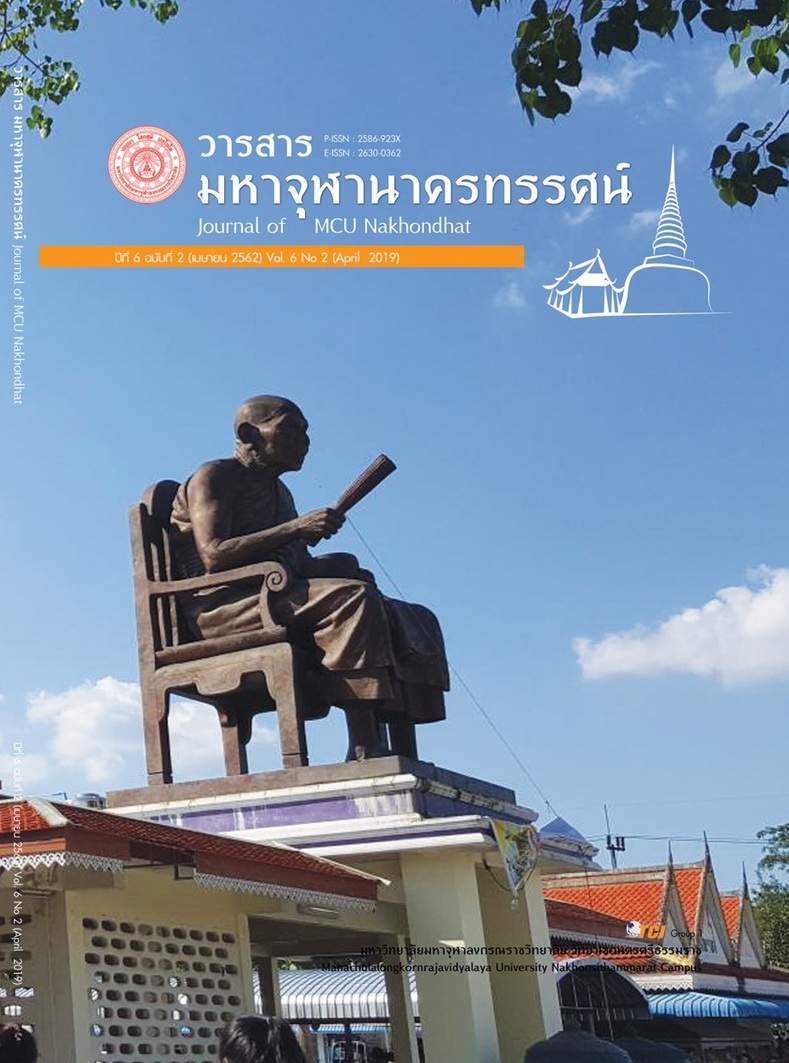A MODEL OF POTENTIAL PERFORMANCE DEVELOPMENT OF INTERNAL SECURITY OPERATION COMMAND IN 1ST AREA BASED ON BUDDHADHAMMA.
Main Article Content
Abstract
The research entitled “A Model of Potential Performance Development of Internal Security Operation Command In 1st Area Based On Buddhadhamma” had 3 main objectives; 1) to analyze the problems of the Potential Performance Development of Internal Security Operation Command In 1st Area Based, 2) to develop a model of potential performance development of internal security operation command in 1st area based on buddhadhamma. And 3) to present a model of potential performance development of internal security operation command in 1st area based on buddhadhamma.The methodology was the mixed method between the qualitative and quantitative methods. The qualitative research collected data from 10 key informants, purposefully selected from 7 managers of the Internal Security Operation Command in 1st Area Based and 3 knowledgeable monks. The tools for collecting data was the structured in-depth interview, collecting data by face-to-face in-depth-interview and analyzing data by the descriptive interpretation.The quantitative research collected data from 306 samples derived from 1.454 populations by questionnaires and analyzed data with descriptive statistics as frequencies, percentages and standard deviation, SD
Findings were as follows:
- 1. The problem of capability development of potential performance of internal security operation command in 1st area based officers could be divided into 4 categories as 1) physical problems, the internal security operation command In 1st Area Based officers lacked physical balance and unable to perform as well as he should, 2) morality problems; they had different background and lacked the appropriate behavioral adjustment, 3) mental problems; the Internal Security Operation Command In 1st Area Based officers lacked the confidence and alertness in performing duties and 4) the intellectual problems, lacking of adjustment, skill and experiences.
- 2. The Potential of performing duties of the Internal security operation command in 1st area based officers on Buddhadhamma were that the pattern of capability development of the Internal Security Operation Command In 1st Area Based officers according the Pavana, Meditation was the firm foundation for body, ethics, mental and wisdom to upgrade the Internal Security Operation Command In 1st Area Based officers to have towards being able to plan tasks, director and liaison. Because of being in the area along the border and in the area next to the border and they were able to help people along the sensitive border as the civilians. As for the findings from the quantitative research were that the Internal Security Operation Command In 1st Area Based officers’ opinions towards the capability development in the areas of physical, morality, mental, and wisdom development were at high level with the average of 4.09 and the opinions towards the honesty development were at the high level.
3. The model of potential performance development of internal security operation command in 1st area based officers on buddhadhamma were that; the physical development, there should be training the perception by the six senses and matter caring and monthly physical check-up, physical test, ready for any circumstances that may arise at all times. Morality development; promotion for the readiness in practicing by the rules, regulation, orders, ethics and good values, attitudes, justice and honesty that are suitable for the Internal security operation command in 1st area based officers. Mental development; Buddhist meditation induces the mental health and mental capability and strong idealism. Buddhist meditation practice yields the mental health. When mentality is strong and secure, the bad action, kamma, will not arise in the mind.Intellectual development; this development should emphasize the awareness of the world changes and know how to solve confronting problems accordingly. The capability development cannot arise overnight by just thinking, but the activities must be repeatedly continued by the academic way or by experiences. The curriculum of capability development must be re-examined yearly including the learning activities by non-formal system and by target areas should be included.
Article Details
References
จุมพล พูลภัทรชีวิน และคณะ. (2549). การวิจัยและพัฒนากระบวนการสร้างความดีมีคุณธรรม. ศูนย์ส่งเสริมและพัฒนาพลังแผ่นดินเชิงคุณธรรม สํานักงานบริหารและพัฒนาองค์ความรู้ (องค์การมหาชน).
ธีรวุฒิ เอกะกุล. (2543). ระเบียบวิธีวิจัยทางพฤติกรรมศาสตร์และสังคมศาสตร์. อุบลราชธานี: สถาบันราชภัฎอุบลราชธานี.
พระธรรมปีฏก (ป. อ. ปยุตฺโต). (2544). พุทธธรรม (ฉบับเดิม) พิมพ์ครั้งที่ 11. กรุงเทพมหานคร: ดวงแก้ว.
พิเชษฐ์ โพธิ์ภักดิ์. (2553). การพัฒนารูปแบบการบริหารโรงเรียนนิติบุคคล สังกัดสำนักงานคณะกรรมการการศึกษาขั้นพื้นฐาน. สาขาบริหารการศึกษา, จุฬาลงกรณ์มหาวิทยาลัย: ดุษฎีนิพนธ์ครุศาสตรดุษฎีบัณฑิต.
ว่าที่ร้อยตรีหญิงสุทธญาณ์ โอบอ้อม. (2558). การพัฒนาศักยภาพบุคลากรขององค์กรปกครองส่วนท้องถิ่น ตามแนวพระพุทธศาสนา. วิทยานิพนธ์ปริญญาพุทธศาสตรดุษฎีบัณฑิต: บัณฑิตวิทยาลัย: มหาวิทยาลัยมหาจุฬาลงกรณราชวิทยาลัย.
Likert, Rensis. (1967). “The Method of Constructing and Attitude Scale”, in Reading in Attitude Theory and Measurement. Fishbeic, Matin, Ed,. New York: Wiley & Son.


